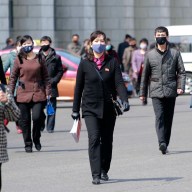 Shailene Woodley and Ansel Elgort swap books in between talking about how they’re going to die young in “The Fault in Our Stars.”
Shailene Woodley and Ansel Elgort swap books in between talking about how they’re going to die young in “The Fault in Our Stars.”
Credit: James Bridges
‘The Fault in Our Stars’
Director: Josh Boone
Stars: Shailene Woodley, Ansel Elgort
Rating: PG-13
3 (out of 5) Globes
“The Fault in Our Stars” is not your typical disease movie. It’s the other kind: the one that thinks it’s above disease movies. Film like this and “50/50” are marked by an awareness of “Love Story,” “Terms of Endearment,” “Dying Young” and ilk, repeatedly assuring us that they’re definitely not one of those. They promise tough talk and an aversion to sentiment, erecting strict rules it will break around the halfway mark. It’s so against cliches it doesn’t even realize it makes a slow descent into a mess of them.
Based on John Green’s YA behemoth, “The Fault in Our Stars” does break ground in one notable way. Usually there’s only one person dying from a disease. This boasts two.Hazel (Shailene Woodley) is a longtime cancer sufferer who’s winningly worldweary. Her steeliness threatens to break when she catches the smirking stares of Augustus (Ansel Elgort), a charming goofball who’s nevertheless lost part of a leg to the disease. She reads downer books and embraces nature in all it dispassion; he reads fantasy and thinks there’s an after life. Nevertheless, it’s not long before they’re swapping favorite reads, cute text messages and, inevitably and despite protestations that this won’t happen, spit.
And yet “The Fault in Our Stars” remains to the end genuinely tough, even after it surrenders to a mess of musical montages set to M83 and a variety of sensitive acoustic guitar-and-piano ballads. (That Hazel briefly sports a Pink Floyd shirt is a cruel tease.) It never wavers; it just softens a little. Okay, it softens a lot, but without losing any respect for the finality of life. “Pain demands to be felt,” goes an underlined aphorism in Hazel’s favorite book, and to its credit the film never forgets that, even as it feels plenty of other, as they say, feels.
 Ansel Elgort and Shailene Woodley take a break from staring into eachother’s eyes and sending cute text messages to egg someone’s house with fellow sufferer Nat Wolff.
Ansel Elgort and Shailene Woodley take a break from staring into eachother’s eyes and sending cute text messages to egg someone’s house with fellow sufferer Nat Wolff.
Credit: James Bridges
It’s still a rocky road. This is a film whose second half is a near-uninterrupted string of montages — a big letdown given the personable tone director Josh Boone brings to the first. A trip to Amsterdam offers a tragically ill-advised visit to the Anne Frank House, where we’re invited to make questionable, basically offensive connections between a girl dying young of cancer and a girl who died young because she was sent to a concentration camp. Not since Steven Spielberg cross-cut a sex scene with the massacre of Israeli athletes in “Munich” has a sequence so called out to be booed.
It does recover, partly thanks to its winning leads and partly due to its supporting players, like Nat Wolff (“Palo Alto”) as a fellow sufferer more bummed out about losing his hot but superficial girlfriend than losing his eyesight. And Laura Dern seems on hand to simply lend gravitas as Hazel’s mom until she’s finally, late in, given a meaty scene to underplay just right. It’s ultimately more afraid of death than it lets on, but it goes farther into the brink than most films like it.
Follow Matt Prigge on Twitter @mattprigge











